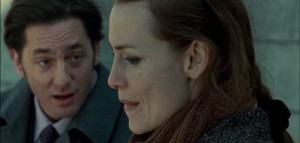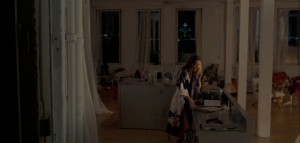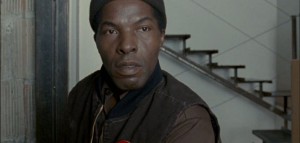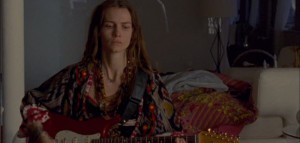The Guitar
 Completely shallow behavior expressed through endless materialism gets a bad rap. Ultimately, we’re all after stuff, better than what our neighbors have anyway. Life is just a series of shopping sprees at the mall, and if we can’t take it with us, we’ll be certain to max out our credit cards trying. Besides, personal relationships are overrated; your plasma TV can keep you plenty warm at night.
Completely shallow behavior expressed through endless materialism gets a bad rap. Ultimately, we’re all after stuff, better than what our neighbors have anyway. Life is just a series of shopping sprees at the mall, and if we can’t take it with us, we’ll be certain to max out our credit cards trying. Besides, personal relationships are overrated; your plasma TV can keep you plenty warm at night.
 That’s why a movie like The Guitar is so refreshing; it takes the satirical sting out of Fight Club, and makes it about praising those desirable IKEA products. If Hollywood has been slowly turning their films into products, like a gateway for product placement and safe, inoffensive messages about society, what better conduit would there be than Amy Redford’s The Guitar, about a woman, played by Saffron Burrows, dying of cancer who decides to use her final two months on the Earth shopping out of a catalog and filling her rented loft apartment with “things”? Redford is the daughter of Hollywood golden boy Robert Redford, which extends another branch to the independent world because of his involvement and creation of the Sundance Film Festival.
That’s why a movie like The Guitar is so refreshing; it takes the satirical sting out of Fight Club, and makes it about praising those desirable IKEA products. If Hollywood has been slowly turning their films into products, like a gateway for product placement and safe, inoffensive messages about society, what better conduit would there be than Amy Redford’s The Guitar, about a woman, played by Saffron Burrows, dying of cancer who decides to use her final two months on the Earth shopping out of a catalog and filling her rented loft apartment with “things”? Redford is the daughter of Hollywood golden boy Robert Redford, which extends another branch to the independent world because of his involvement and creation of the Sundance Film Festival.
 And yet, despite a nearly perfect representation of Hollywood’s viewpoint, The Guitar had to be shot on the cheap, like a stage play, with character actors like David Wain, Janeane Garofolo (playing the doctor who informs Burrows of her fate, a veritable angel of death), Paz De La Huerta, and Isaach De Bankolé showing up for a few minutes of time, and then exiting, so we can be alone with our bourgeois-craving heroine. Burrows even goes through her terminal cancer stages looking and sounding like the statuesque model that she is, reinforcing the age-old studio rule that suffering is glamorous. That’s why De La Huerta, as a pizza delivery girl, and Bankolé, as the package delivery man, show up to have sex with Burrows at convenient moments, and leaving just as quickly (as if we were in a door-slamming stage bound British farce, but without the doors or the farce*), to prove that just because you have no family, friends, personality, or tangible human connections, doesn’t mean you can’t have tasteful, soft-core sex. Or threesomes.
And yet, despite a nearly perfect representation of Hollywood’s viewpoint, The Guitar had to be shot on the cheap, like a stage play, with character actors like David Wain, Janeane Garofolo (playing the doctor who informs Burrows of her fate, a veritable angel of death), Paz De La Huerta, and Isaach De Bankolé showing up for a few minutes of time, and then exiting, so we can be alone with our bourgeois-craving heroine. Burrows even goes through her terminal cancer stages looking and sounding like the statuesque model that she is, reinforcing the age-old studio rule that suffering is glamorous. That’s why De La Huerta, as a pizza delivery girl, and Bankolé, as the package delivery man, show up to have sex with Burrows at convenient moments, and leaving just as quickly (as if we were in a door-slamming stage bound British farce, but without the doors or the farce*), to prove that just because you have no family, friends, personality, or tangible human connections, doesn’t mean you can’t have tasteful, soft-core sex. Or threesomes.
 Amos Poe’s script (he wrote and directed one of the best worst movies ever, Frogs For Snakes) is tantalizing with regards to reality, Burrows is dumped by her boyfriend and fired from her job on the same day as her death is prognosticated, manages to use an amplifier for her guitar without plugging it in, and even though she’s a vegetarian, has no stomach trouble eating mountains of meat on a whim. Poe is clearly subtle with his meat = sexual awakening analogies. He delivers the most horrifying moment for Burrows, when she reaches her credit limit while ordering gourmet food on the phone, for the beginning of Act III, meaning that we’ll have to suffer along with her, even if she has to dig through her newly purchased couch for tip money. As her fate has been sealed, she must bury her sadness in her fancy guitar, a red one that she’s had a lifelong dream of owning. The Guitar clearly sustains more depth than Isabel Coixet’s similar (and recent) pretty-girl-who-knows-she-only-has-a-few months-to-live drama, My Life Without Me, which had the gaul to attempt to deal with the familial complications created by impending death, and if the girl, Sarah Polley, and her behavior, trying to experience things that she never had a chance to because of her concessions to adult responsibility, could be considered selfish. If anything, I’m quite surprised that Redford couldn’t get funding from the most obvious sources, Visa or American Express, since The Guitar plays like a cautionary tale about financial responsibility, not mortality. Maybe Redford should have had a ticker at the bottom of the screen that said FreeCreditReport.com?
Amos Poe’s script (he wrote and directed one of the best worst movies ever, Frogs For Snakes) is tantalizing with regards to reality, Burrows is dumped by her boyfriend and fired from her job on the same day as her death is prognosticated, manages to use an amplifier for her guitar without plugging it in, and even though she’s a vegetarian, has no stomach trouble eating mountains of meat on a whim. Poe is clearly subtle with his meat = sexual awakening analogies. He delivers the most horrifying moment for Burrows, when she reaches her credit limit while ordering gourmet food on the phone, for the beginning of Act III, meaning that we’ll have to suffer along with her, even if she has to dig through her newly purchased couch for tip money. As her fate has been sealed, she must bury her sadness in her fancy guitar, a red one that she’s had a lifelong dream of owning. The Guitar clearly sustains more depth than Isabel Coixet’s similar (and recent) pretty-girl-who-knows-she-only-has-a-few months-to-live drama, My Life Without Me, which had the gaul to attempt to deal with the familial complications created by impending death, and if the girl, Sarah Polley, and her behavior, trying to experience things that she never had a chance to because of her concessions to adult responsibility, could be considered selfish. If anything, I’m quite surprised that Redford couldn’t get funding from the most obvious sources, Visa or American Express, since The Guitar plays like a cautionary tale about financial responsibility, not mortality. Maybe Redford should have had a ticker at the bottom of the screen that said FreeCreditReport.com?
* Burrows is British.



